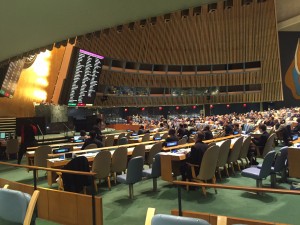UN Budget for 2016/17 adopted by UN General Assembly
After months of debate and several all-night negotiation sessions of its Fifth Committee (administrative and budgetary), the UN General Assembly tonight (23 December) passed the UN’s Budget for 2016-17 — a day earlier than many diplomats expected.
The President of the UN General Assembly Mogens Lykketoft gavelled the UN’s programme budget for the next biennium 2016/17, including the budget for the Special Political Missions, at the amount of US$ 5.4 billion.
In previous years, discussions on the UN’s budget which includes staffing, travel, peacekeeping and administrative costs, have gone on until the early hours of Christmas Day (25th December) and even into the following year.
“I am very satisfied that the negotiations on the budget and other administrative items were concluded in such good spirit,” Mr Lykketoft said. “I congratulate all the delegates for their hard work in the past months and in the last very intensive days and want to thank the Chair , the Permanent Representative of Nepal, Mr. Durga Prasad Bhattarai for his excellent conduct of the negotiations.”
“With the adoption of the UN budget and the conclusion of the work of the 5th Committee we come to the end of what has been a remarkable year for multilateralism,” Mr Lykketoft added.
The General Assembly also decided on the Scales of Assessment that determine the contribution of each Member State to the Regular and Peace keeping Operations Budget, which is reviewed every three years.
While the methodology for the Regular Budget Scale of Assessment remains unchanged, in the Scale for Peace-keeping Operations, the GA agreed to some transitional measures for one Member State that will graduate from one category to another. A resolution giving the green light for the renovation project of the UN Office at Geneva – the Palais des Nations – was also adopted.
A number of additional decisions were taken, including on some reform projects such as further implementation of the UN’s transition to the new enterprise resource planning system (UMOJA), and streamlining the UN’s delivery of services (Global Service Delivery Model).
Member Sates also agreed to undertake a major reform of the UN Common System Compensation package, the first reform of this kind in 25 years.


